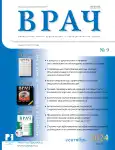Distribution of polymorphic variants of the mannose-binding lectin gene (MBL2) in children with mild and severe asthma
- Authors: Marchenko I.V.1, Afonicheva K.V.1, Tereshchenko S.Y.1, Smolnikova M.V.1
-
Affiliations:
- Krasnoyarsk Science Center of the Siberian Branch of the Russian Academy of Sciences
- Issue: Vol 35, No 9 (2024)
- Pages: 64-68
- Section: From Practice
- URL: https://bakhtiniada.ru/0236-3054/article/view/266793
- DOI: https://doi.org/10.29296/25877305-2024-09-13
- ID: 266793
Cite item
Abstract
Asthma is one of the most common inflammatory diseases in the world. One of the factors in the development of this disease is a low concentration of mannose-binding lectin (MBL), encoded by the MBL2 gene.
Purpose. To study the distribution of genotypes and alleles of polymorphic variants of the MBL2 gene in children with asthma.
Material and methods. The study included children with diagnosed bronchial asthma (n=400) (Krasnoyarsk). The control group consisted of children comparable in gender and age to the patients (n=229) and newborns (n=302). GINA-202 guidelines were used to determine the severity of the disease.
Results. Statistically significant differences were identified for polymorphisms localized in the first exon of the gene – rs1800450 and rs1800451. A low occurrence of the BB rs1800450 genotype in sick and healthy children was revealed, which may be associated with early mortality or disability due to severe infections with severe MBL deficiency. Homozygotes for the mutant allele C of the rs1800451 MBL2 polymorphism were not found in any of the comparison groups, which indicates a rare distribution of this allele in Caucasian populations.
Conclusion. The present study showed that polymorphisms in the MBL2 gene play a predisposing role in the development of diseases of the bronchopulmonary system using the example of asthma.
Full Text
##article.viewOnOriginalSite##About the authors
I. V. Marchenko
Krasnoyarsk Science Center of the Siberian Branch of the Russian Academy of Sciences
Author for correspondence.
Email: smarinv@yandex.ru
ORCID iD: 0000-0001-9795-2056
Russian Federation, Krasnoyarsk
K. V. Afonicheva
Krasnoyarsk Science Center of the Siberian Branch of the Russian Academy of Sciences
Email: smarinv@yandex.ru
ORCID iD: 0000-0002-5006-0429
Russian Federation, Krasnoyarsk
S. Yu. Tereshchenko
Krasnoyarsk Science Center of the Siberian Branch of the Russian Academy of Sciences
Email: smarinv@yandex.ru
ORCID iD: 0000-0002-1605-7859
Doctor of Medical Sciences, Professor
Russian Federation, KrasnoyarskM. V. Smolnikova
Krasnoyarsk Science Center of the Siberian Branch of the Russian Academy of Sciences
Email: smarinv@yandex.ru
ORCID iD: 0000-0001-9984-2029
Candidate of Biological Sciences
Russian Federation, KrasnoyarskReferences
- Asher M.I., Rutter C.E., Bissell K. et al. Worldwide trends in the burden of asthma symptoms in school-aged children: Global Asthma Network Phase I cross-sectional study. Lancet. 2021; 398 (10311): 1569–80. doi: 10.1016/S0140-6736(21)01450-1
- GINA Scientific Committee. Global Initiative for Asthma – GINA [Electronic resource]. Global Initiative for Asthma – GINA. URL: https://ginasthma.org/
- Asher I., Bissell K., Ellwood P. et al. Global asthma network identifies gaps in essential asthma medicines. European Respiratory Journal. European Respiratory Society. 2016; 48 (60): PA4186. doi: 10.1183/13993003.congress-2016.PA4186
- Taheri M., Karimloo R., Sarani H. et al. Association Study of MBL2 Gene Polymorphisms and Risk of Tuberculosis in Southeast of Iran. Prague Med Rep. 2020; 121 (4): 236–43. doi: 10.14712/23362936.2020.20
- Liu M., Wang Q., Liu H. et al. Association of Mannose-Binding Lectin 2 Gene Polymorphism with Tuberculosis Based on Mycobacterium tuberculosis Lineages. Infect Drug Resist. 2022; 15: 1225–34. doi: 10.2147/IDR.S344935
- Rantala A., Lajunen T., Juvonen R. et al. Mannose-binding lectin concentrations, MBL2 polymorphisms, and susceptibility to respiratory tract infections in young men. J Infect Dis. 2008; 198 (8): 1247–53. doi: 10.1086/591912
- Speletas M., Dadouli K., Syrakouli A. et al. MBL deficiency-causing B allele (rs1800450) as a risk factor for severe COVID-19. Immunobiology. 2021; 226 (6): 152136. doi: 10.1016/j.imbio.2021.152136
- Li X., Cao X., El-Ashram S. et al. MBL2 rs7095891 G > A polymorphism was associated with an increased risk of tuberculosis in the Chinese Uygur population. Int J Mol Epidemiol Genet. 2018; 9 (5): 64–70.
- Borta S., Popetiu R., Donath-Miklos I. et al. Genetic Polymorphism of MBL2 in Patients with Allergic Bronchial Asthma. Maedica (Bucur). 2019; 14 (3): 208–12. doi: 10.26574/maedica.2019
- Garred P., Larsen F., Madsen H.O. et al. Mannose-binding lectin deficiency – revisited. Mol Immunol. 2003; 40 (2–4): 73–84. doi: 10.1016/s0161-5890(03)00104-4
- Tran H.B., Ahern J., Hodge G. et al. Oxidative Stress Decreases Functional Airway Mannose Binding Lectin in COPD. PLOS One. 2014; 9 (6): e98571. doi: 10.1371/journal.pone.0098571
- de Andrade L.V., de Souza Sá M.V., Vasconcelos B. et al. High production MBL2 polymorphisms protect against COVID-19 complications in critically ill patients: A retrospective cohort study. Heliyon. 2023; 10 (1): e23670. doi: 10.1016/j.heliyon.2023.e23670
- da Cruz H.L.A., da Silva R.C., Segat L. et al. MBL2 gene polymorphisms and susceptibility to tuberculosis in a northeastern Brazilian population. Infect Genet Evol. 2013; 19: 323–9. doi: 10.1016/j.meegid.2013.03.002
- Malaquias M.A.S., Gadotti A.C., da Silva Motta J. Jr. et al. The role of the lectin pathway of the complement system in SARS-CoV-2 lung injury. Transl Res. 2021; 231: 55–63. doi: 10.1016/j.trsl.2020.11.008
- Mao Y., Wei H., Gong Y. et al. Association of MBL2 gene polymorphisms and MBL levels with dilated cardiomyopathy in a Chinese Han population. BMC Med Genomics. 2024; 17 (1): 11. doi: 10.1186/s12920-023-01787-2
Supplementary files








